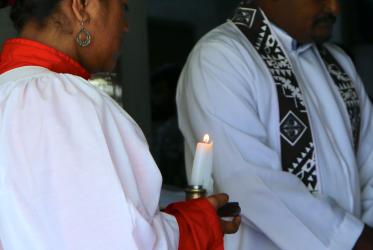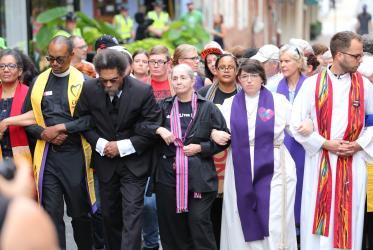Bible study 2
By Katie G. Cannon
Amos 5:14-24
Translation: New Revised Standard Version
14Seek good and not evil, that you may live; and so the Lord, the God of hosts, will be with you, just as you have said. 15Hate evil and love good, and establish justice in the gate; it may be that the Lord, the God of hosts, will be gracious to the remnant of Joseph.
16Therefore thus says the Lord, the God of hosts, the Lord: In all the squares there shall be wailing; and in all the streets they shall say, “Alas! alas!” They shall call the farmers to mourning, and those skilled in lamentation, to wailing; 17in all the vineyards there shall be wailing, for I will pass through the midst of you, says the Lord.
18Alas for you who desire the day of the Lord! Why do you want the day of the Lord? It is darkness, not light; 19as if someone fled from a lion, and was met by a bear; or went into the house and rested a hand against the wall, and was bitten by a snake. 20Is not the day of the Lord darkness, not light, and gloom with no brightness in it?
21I hate, I despise your festivals, and I take no delight in your solemn assemblies. 22Even though you offer me your burnt offerings and grain offerings, I will not accept them; and the offerings of well-being of your fatted animals I will not look upon. 23Take away from me the noise of your songs; I will not listen to the melody of your harps.
24But let justice roll down like waters, and righteousness like an everflowing stream.
The text in its context
In Amos 5:14-24, the prophet proclaims a judgment against the inhabitants of the land who fail to fulfill ethical obligations incumbent upon them. This text begins with Amos confronting his audience with the word of Yahweh, as if Yahweh were delivering the oracle. Amos says that even though the people can bear witness to safe escapes from hurt, harm, and danger in the past, and can testify to how Yahweh defeated the enemies of the Israelites by military might, the people have become morally reckless in dealing justly with one another.
Contrary to popular opinion, the theme, roll justice, announcing what is required in a covenantal relationship between God and God’s people, has been and always will be more of a problem for insiders than for outsiders. The reason for this, according to Amos, the 8th century BCE prophet, is that it is far easier for religious insiders to deceive ourselves about living faithfully than it is for women, men, and children not engaged in a divine-love connection. Living authentically as Christian disciples is difficult for us to actualize twenty-four hours per day, seven days each week, especially when we get lost in religious self-security, mesmerized by forms of worship that deceive us mightily.
Therefore, the heart of Amos’s message foretells the judgment of defeat and exile through which Israel must pass in consequence of its disobedience to the standards demanded by Yahweh.
Admonition and Warning. Amos 5: 14-15. If the Israelites want Yahweh to be with them, then they are obliged to act decisively in relation to this symmetrical mandate “to seek good and not evil… to hate evil and love good.” It is important to remember that Amos does not mention the word covenant. But he implies that life is not to be regulated by law and legal agreements; instead, the loving relationship between God and God’s people should cause us to turn from sin and live. The central idea in these verses is that the special relationship of Yahweh to the people is essentially a call for discernment between good and evil.
Proclamation and Lamentation. Amos 5: 16 -17. The excruciating image of brokenhearted sorrow and gut-wrenching anguish portrayed in verses 16-17 is that the city and countryside will be submerged in expressions of grief –high pitch cries of pain, uncontrollable wailing, incessant bawling and babbling, full of excruciating sounds of deep distress. Situating this condition of proclamation-lamentation in its historical-cultural context, Hans Walter Wolff says that the 8th century ceremonial funerary requirements consist of fasting, rending clothes, wearing sackcloth, shearing the hair, and sprinkling dust on the head. Due to the prophesied catastrophic loss, unrestrained misery will fill up all living places and spaces. And in turn, the people will need to call on professional mourners to assist them during this devastated time of bereavement.
The brief, terse statement at the end of verse 17 underscores that instead of Yahweh passing by and sparing the people, this time Yahweh will come front and center, exacting punitive action in the people’s interior core.
Gloom and Doom. Amos 5: 18 -20. The gloom and doom of “darkness, not light,” are code words for fatal devastation. Amos’ woe-oracle is sharp and dramatic. Three times he repeats the refrain, “the day of Yahweh.” Amos seeks by unusual and varied means to draw the audience out of the confines of its self-disillusionment and ritualistic repetitiveness.
Hans Wolff says those who eagerly wish and yearn for “the day of Yahweh” embark on a perilous desire. “This precise catch phrase, “day of Yahweh” originally referred to traditions of victorious holy war. But, here, “day of Yahweh” is subsumed under funerary lamentation. According to the prophetic threat of Amos, the “day of Yahweh” will not be a triumphant time, but, the “day of Yahweh will be the inescapable, gloomy judgment day, Israel’s final defeat.” [1]
Verse 19 has been recognized as a story that should be interpreted as an allegory. This brief sketch tells of someone who twice escapes from life’s dangers, fleeing from a lion only to be suddenly confronted by a bear. The person pursued is able to escape from both dangerous animals, and even manages to flee safely into a house. When the person leans his hand against the wall, as much from exhaustion as from relief, an unnoticed snake fatally bites him. Precisely at the moment when the person feels secure, he dies.
Renunciation and Alienation. Amos 5: 21 – 23. Amos was a fearless champion of the oppressed. He lived during a time when judicial proceedings were deplorable, when wealthy, affluent upper-classes dispossessed the poor, and when priests placed undue emphasis upon offerings, rituals, and sacrifices with only slight attention to moral conduct. Amos objected to divorcing religious ritual from ethical living. For Amos, the antithesis of covenantal norms were (1) persecution and victimization of honest people, (2) drunkenness, (3) lack of humanitarian virtues, and (4) religious feasts celebrating the material gains wrung from the needy. Indeed, central to the whole issue is confrontation with the inescapable reality of the living God, who demands justice and righteousness and who announces Yahweh’s imminent intervention.
A number of biblical scholars agree that singing was not being rejected by means of renouncing a cultic decision; instead, this injunction demands the immediate removal of songs and harps, and the sheer, ecstatic tumult of the singers at the harvest festivals, because the sound is referred to as a roaring noise, a word also used to describe the din of battle. The culmination of Amos’ line of reasoning is his denunciation of Israel’s overconfidence as God’s special darling, resulting in the people’s apostasy against Yahweh. In essence, the relationship between God and God’s people is revocable. Salvation history can definitely be reversed, cancelled altogether.
Wolff notes that nowhere but here do we find immediately juxtaposed these harshest of renunciation statements, “I hate, I reject.” Wolff understands that directly following upon this fundamental statement, which passionately and sweepingly rejects all sacrificial offerings, liturgical gifts, and the cultic festivities, is a clarification of the divine attitude as well as of the festal activities in question.
But let justice roll down like waters,
and righteousness like an everflowing stream.
The focal point of this scripture lesson is that instead of the noise of cultic praise, something altogether different was to be heard and, consequently, practiced in the assembly of Israel: the two foci of prophetic ethics, justice and righteousness.
The text in its context
“Roll justice” is an instructive, ethical mandate. It is a call for moral agency. Justice is the framework that gives form and substance to the social life of the religious community. Indeed, the distinctive stamp of the Yahwist theology preached by Amos is that the essence of faithfulness requires us to live daily in accordance with the moral principles of equality.
Amos makes this point abundantly clear when he tells the story about the person who escaped safely from both the lion and bear, but loses his or her life while resting in false security. Far too often, religious people get lost in formalities of worship and neglect acting in just ways.
The relevant message in Amos’s prophecies for contemporary Christians is a call to renew our covenantal commitment, wherein we actualize an embodied faith that is effective in serving the present age. To make this point another way—if we want it to be well with our souls, then the emphasis for religious renewal is on the ethical quality of right-relating with each other in our daily living, rather than on the quantity of our participation in ceremonial rituals and festival assemblies. If 21st century ecclesiastical communities want justice to “roll down like waters, and righteousness like an everflowing stream,” there must be consistency between our words and our deeds.
Questions for reflection and discussion
1) If we desire to live and worship authentically as religious women, men, and children who adhere to covenantal ethics, then take a justice inventory. Let us ask ourselves what are we doing so that justice can roll in terms of the following everyday realities:
- innocent people victimized and persecuted in judicial court procedures
- poor, needy, and oppressed people arbitrarily exploited by the demands of the rich
- individuals traumatized by violence, extortion, physical and sexual abuse
- inequitable practices of taxation and
- dehumanizing elements entrenched in globalized technocratic, digitized systems of production in our church communities?
2) What stands out in your life-journey as situations of doom and gloom?
3) How does this Bible study lead you to new considerations regarding faithful discipleship applicable to situations in your daily life?
4) Share examples of the work of justice in the 21st century.
Prayer
God, our Creator and Sustainer,
we are grateful for Christian unity.
Show us how to express the graces of faith, hope, and love in private and collective endeavors.
In the midst of creedal and organizational diversity,
keep us mindful of the needs of local souls
and the transcending boundaries of universal justice.
“Give us courage to seek good and not evil, that we may live.” Amen.
About the author
Katie G. Cannon is the Annie Scales Rogers Professor of Christian Ethics at Union Presbyterian Seminary in Richmond, Virginia, USA.
[1] Hans Walter Wolff, A Commentary on the Books of the Prophet Joel and Amos (Philadelphia: Fortress Press, 1977], 256.

